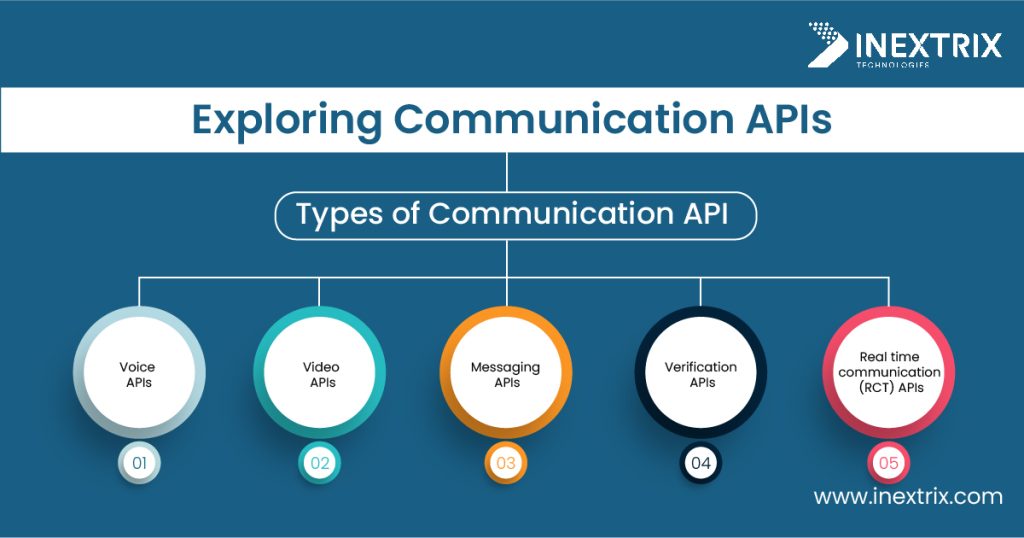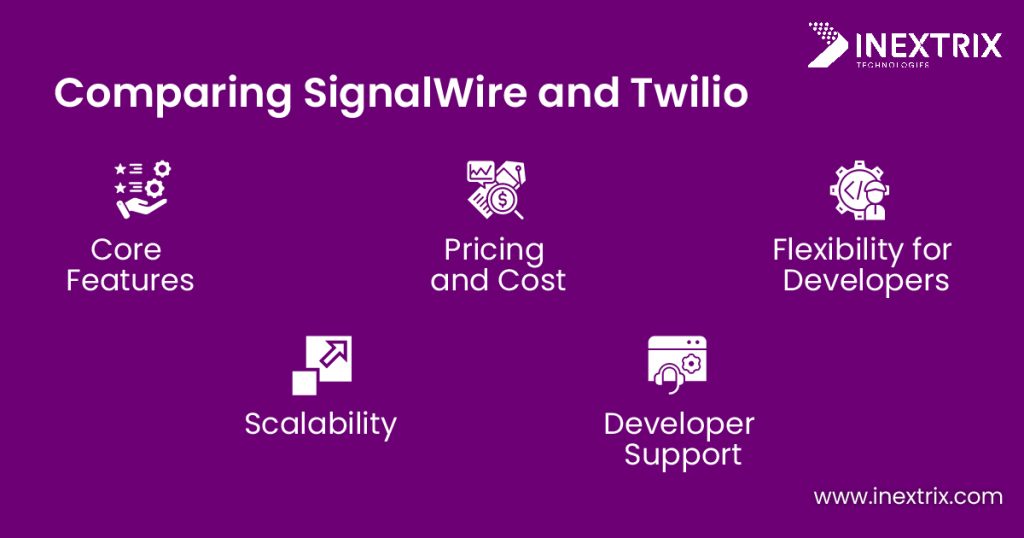The demand for tailored communication tools is pretty high in the 21st century. This creates pressure on businesses to build powerful communication applications at a rapid rate. However, developing a custom telephony platform is a time-intensive job. Therefore, businesses look for APIs. The role of APIs in communication software development is epic. Several platforms provide APIs to development companies. In this race to offer the best communication APIs, Twilio and SignalWire API development are at the foremost position.
Both Twilio and SignalWire provide different types of communication APIs to developers and development companies. However, according to the experts, SignalWire has to be the preferred choice of development companies and developers compared to Twilio.
In this blog post, we will discuss details about these popular communication APIs. Moreover, we will discuss what makes SignalWire communication APIs better than Twilio’s APIs.
This might sound like a technical topic and yes, it is. However, even business users and decision make involved in the technology selection process must know the facts related to different technologies, APIs, and frameworks. So, what are you waiting for? Read on.
1. Understanding Communication APIs

Developers define a set of protocols and rules and encapsulate them in a short program. This program is known as API (Application Programming Interface). The main role of an API is to let two different software applications or mobile apps communicate with each other. Moreover, these APIs can also exchange data, commands, and more.
Certainly, communication APIs are completely dedicated to providing features to a communication application. Therefore, it supports the exchange of data, triggering different events, and making required actions in the telephony apps. Moreover, communication apps will specifically work on voice, video, data, text messages, and multimedia files. Certainly, these are different types of communication media representing all media types of business use in routine.
Types of Communication APIs
Depending on the API provider or partner, there are different types of APIs available. The major five types of communication APIs are briefly explained hereunder.
Voice APIs
These APIs provide features related to voice calling such as making voice calls, recording calls, IVR, transcript, and more. Furthermore, it lets voice API integration with any real time or SIP signaling application.
Video APIs
Certainly, these APIs support video based communication in software. It supports streaming live videos for webinars or presentations. Moreover, it also supports video calls, video chats, and video conferences.
Messaging APIs
Voice and video calls are necessary in any business. Additionally, businesses need to exchange messages that include text messages in the form of chat, SMS, and MMS. Moreover, business communication apps need the exchange of multimedia messages such as files, animation, and similar data. Certainly, messaging APIs provide these message exchange functionalities.
Verification APIs
Secure communication is the need of the time. Therefore, it is necessary to focus on building the best and most secure communication apps. Verification APIs help in implementing a two-way authentication process to make communication secure. It adds an added layer of security to the app.
Real time communication (RCT) APIs
Definitely, real time communication is the need of the time. WebRTC is one of the best technologies that support real time communication. RCT APIs are available to support real time communication features like calling, conferences, messaging, and more. These communication features are easy to integrate in different browsers and applications to support communication.
2. Benefits of Using APIs

You might have a question about communication solutions that provide these features. Then, what is the need for using communication APIs? Then, you must know the benefits of investing in third party API integration services. Certainly, you must look at the major advantages available to companies that use communication APIs.
Reduce Development Lifecycle
Definitely, different communication solutions have different roles to play. Therefore, they will have some unique features. However, some features are common in all communication tools such as phone calls, video calls, three-way conferencing, and more. Therefore, companies like SignalWire have developed APIs for these features. With the integration of these APIs, the fundamental features are easily added to the communication app. Moreover, it does not require added development. As a result, the development life cycle is shortened.
For example, SignalWire API integration is useful in adding the required communication features to any communication app. However, your developer will not require any sort of development. Simply, it is the integration of communication APIs.
Augment Functionalities of Communication Apps
In addition to from scratch development, customization of existing VoIP apps is also required. Integration of APIs helps in adding the missing or required features in the existing apps. As a result, it helps in extending functionalities into the existing communication apps.
Save Resources
Certainly, communication solutions and apps require communication features. However, developing all features from scratch requires experienced developers, time, and money. Unlike that, using communication APIs saves all these resources up to 50% or more because it does not require any development. With the help of API integration, you can save a lot of resources. As a result, you can develop a complete IP PBX solution and still save your resources up to 50% or more.
3. Brief Introduction of SignalWire APIs
The team of FreeSWITCH founded SignalWire. SignalWire APIs are cloud based communication APIs. These APIs are available to add communication features, including, but not limited to voice, video, messaging, and RTC (Real Time Communication). Moreover, these APIs are easily customizable. It means companies can invest in SignalWire API development. This development process will customize existing SignalWire APIs.
Some of the popular features available to SignalWire API users are listed hereunder:
- Phone calls
- Video calls
- Conference calls
- Real time video streaming
- SMS
- MMS
- Push notifications and alerts
- IVR
- Call routing
- Data exchange
4. Brief Introduction of Twilio APIs
Twilio is another player in the communication API industry. Moreover, it is as popular as SignalWire. Similar to SignalWire, Twilio also offers communication APIs to integrate in telephony applications and platforms to add missing features. Fundamentally, Twilio positions itself as a customer engagement and/or API company. It is an American company that offers several offerings, including, but not limited to communication APIs.
Transform your business communications with our specialized SignalWire API development.
In addition to voice, video, and messaging APIs similar to SignalWire, it offers email and Flex APIs to developers. Interestingly, Flex APIs provide features of call center software. Moreover, email APIs provide email communication related features. Any experienced developer can help in Twilio API integration to add the required communication features.
Some of the popular features available to SignalWire API users are listed hereunder:
- Phone calls
- Video calls
- Conference calls
- Voice logging
- Screen sharing
- Screen recording
- SMS
- MMS
- WhatsApp messaging
- IVR
- Call routing
- Email management
- Call center features
5. SignalWire vs. Twilio

There are several communication API providers available in the VoIP industry. However, SignalWire and Twilio are definitely popular names in this industry. Therefore, it is necessary to learn the real difference between both of them. Hence, we help businesses make the right decision to build an empowered communication ecosystem, we have a complete comparison here. Moreover, we have covered all major factors that give a clear indication of what makes SignalWire a better choice compared to Twilio.
Core Features
SignalWire provides communication APIs for voice, video, texting, and real time communication. Moreover, these APIs are highly flexible to use and customize. In addition to that, SignalWire supports multiple programming and development platforms and frameworks. As a result, it is easier to leverage the full potential of SignalWire APIs.
It must intrigue you to know more about SignalWire APIs. Certainly, we have an interesting recommendation for you. You must read our blog post covering A Complete Guide on SignalWire. It shares a brief yet effective introduction to this FreeSWITCH based communication API. Moreover, it also sheds light on consultation services and their usefulness while using SignalWire APIs.
Certainly, Twilio has more communication APIs to offer compared to SignalWire. For example, it offers all communication APIs that are available with SignalWire. In addition to that, it also offers APIs for WhatsApp communication, call center related customer engagement features, email communication, etc. However, it does not support as many programming languages as SignalWire APIs do. Moreover, it also lacks flexibility when compared with its competitors.
As a result, SignalWire has an upper hand than its counterpart.
Pricing and Cost
SignalWire offers competitive rates to use its cloud based communication APIs. Moreover, it is renowned for its transparent pricing model with no hidden charges. Furthermore, it also has flexible pricing options to choose from. For example, you can choose either subscription based pricing model or a pay-as-you-go model.
Twilio provides only a pay-as-you-go model. However, it offers bulk discounts to users with mass volume.
SignalWire is a clear winner if we talk about cost and expenses. Twilio is known for its higher price compared to other competitors, including, but not limited to SignalWire. Moreover, you will miss pricing transparency in Twilio. As a result, SignalWire has become a preferred choice for communication APIs.
Flexibility for Developers
The FreeSWITCH development team that has been developing communication platforms has developed SignalWire APIs. Therefore, developers have integrated commendable flexibility into this platform. It means even if you don’t use third party API integration services, you can integrate these APIs by yourself. Certainly, you need some sort of technical knowledge for that. In addition to integration, the flexible nature of these APIs gives an added advantage to developers. They can make any sort of changes and customizations in these APIs. As a result, more flexible and tailored communication platforms are produced.
On the other hand, Twilio API integration is not as flexible as SignalWire. Definitely, Twilio provides documentation and SDK support to make the whole process simplified. However, it still requires experience for integration.
Scalability
SignalWire APIs are developed with a mindset of supporting high call volume even with low bandwidth.
Undoubtedly, Twilio also supports scalable communication platform development. However, its infrastructure is not built as SignalWire. Therefore, low latency and bandwidth can definitely cause a hurdle in scalability. Moreover, it can also hamper the performance of the communication software.
In short, SignalWire provides a more reliable and scalable platform than Twilio. Unquestionably, the clear reason is its infrastructure with a geo-redundancy feature that supports excellent performance even in low latency. As a result, developers can build highly scalable solutions. Moreover, they can achieve rapid scalability whenever required.
Developer Support
SignalWire is popular for building a highly flexible and developer friendly platform. As a result, it has added the highest level of flexibility for developers. Undoubtedly, it supports a wide range of development frameworks and languages. As a result, any developer can use these communication APIs. Moreover, SignalWire provides excellent development tools such as clear documentation, SDKs, and even community support. Furthermore, VoIP developers have developed these APIs. Certainly, in a majority of cases, VoIP developers develop communication solutions. Therefore, it is extremely easy for them to use these APIs because native developers have developed these APIs with the same mindset.
Certainly, Twilio also provides a range of support tools to make developers’ experience seamless. For example, Twilio provides tutorials, a Sandbox environment, documentation, testing tools, and more. Furthermore, it also has community support to offer. However, the expert mind and community of communication developers are missing. Moreover, there are restrictions on development platforms.
As a result, SignalWire API integration is really seamless and effortless for developers. Moreover, they are more developer friendly than Twilio.
Concluding Note
Certainly, SignalWire and Twilio have excellent communication APIs to offer. However, SignalWire is definitely more prominent than Twilio in many cases as we have discussed in this blog post. Unquestionably, SignalWire provides a more flexible, reliable, scalable, cost effective, and developer friendly platform. As a result, SignalWire communication APIs are leading the race. Additionally, companies and developers working in this industry highly recommend SignalWire communication APIs.
We have years of experience working with different APIs and developing communication tools. Certainly, we can help you answer any of your questions related to Twilio or SignalWire API development. To get answers to your queries, you can contact us anytime.
